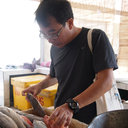Tea polyphenol (-)-epigallocatechin 3-gallate suppresses heregulin-beta1-induced fatty acid synthase expression in human breast cancer cells by inhibiting phosphatidylinositol 3-kinase/Akt and mitogen-activated protein kinase cascade signaling.
키워드
요약
Tumor-associated fatty acid synthase (FAS) is implicated in tumorigenesis and connected to HER2 (human epidermal growth factor receptor 2) by systemic analyses. Suppression of FAS in cancer cells may lead to growth inhibition and cell apoptosis. Our previous study demonstrated that (-)-epigallocatechin 3-gallate (EGCG), the green tea catechin, could down-regulate FAS expression by suppressing EGFR (epidermal growth factor receptor) signaling and downstream phosphatidylinositol 3-kinase (PI3K)/Akt activation in the MCF-7 breast cancer cell line. Herein, we examined the effects of EGCG on FAS expression modulated by another member of the erbB family, that is, HER2 or HER3. We identified that heregulin-beta1 (HRG-beta1), a HER3 ligand, stimulated dose-dependent FAS expression in breast cancer cell lines MCF-7 and AU565, but not MDA-MB-453. The time-dependent increase in FAS expression after HRG-beta1 stimulation was also observed in MCF-7 cells, and this up-regulation was de novo RNA synthesis dependent. Treatment of MCF-7 cells with EGCG markedly inhibited HRG-beta1-dependent induction of mRNA and protein of FAS. EGCG also decreased the phosphorylation of Akt and extracellular signal-regulated kinase 1/2 that were demonstrated as selected downstream HRG-beta1-responsive kinases required for FAS expression using dominant-negative Akt, PI3K inhibitors (LY294002 and wortmannin), or MEK inhibitor (PD98059). FAS induction by HRG-beta1 was also blocked by AG825, a selective HER2 inhibitor, and by genistein, a selective tyrosine kinase inhibitor, indicating the formation of a heterodimer between HER2 and HER3, and their tyrosine kinase activities are essential for HRG-beta1-mediated elevation of FAS. Additionally, growth inhibition of HRG-beta1-treated cells was parallel to suppression of FAS by EGCG. Taken together, these findings extend our previous study to indicate that EGCG may be useful in the chemoprevention of breast carcinoma in which FAS overexpression results from HER2 or/and HER3 signaling.


